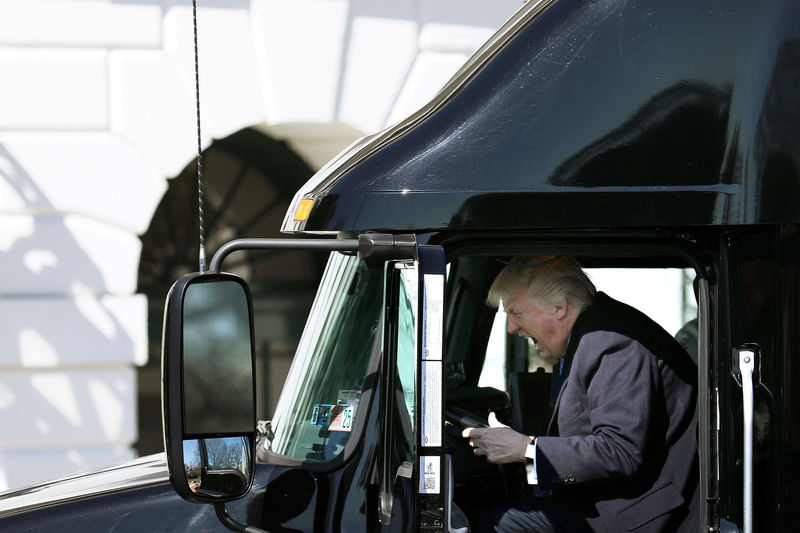By Yasmeen Abutaleb, David Morgan and Emily Stephenson
WASHINGTON (Reuters) - In the middle of a confused three-day scramble by U.S. Republicans to save their plan to dismantle Obamacare, President Donald Trump telephoned a former small-town sandwich shop owner from the North Carolina mountains on Wednesday afternoon.
Representative Mark Meadows took the call during a meeting of the Freedom Caucus, a conservative faction of the House of Representatives he chairs. His talk with Trump thrust Meadows into the eye of a legislative storm that led to a pivotal vote on the bill being postponed. Then, late on Thursday after Trump demanded action by the House, a final vote was set for Friday.
Through it all, Meadows has been a key player in Trump's first major legislative initiative, an effort as chaotic and unpredictable as his campaign for the White House, with its ultimate outcome still in doubt late on Thursday night.
After promising for months as a candidate to repeal and replace Obamacare, Trump has still not produced his own plan to do so, choosing instead to support a rollback bill drafted by senior House Republicans, including House Speaker Paul Ryan.
Financial markets have watched the drama over the bill nervously, concerned that defeat or delay for it could undermine Trump's ability to carry through on promises to cut taxes and reduce regulation that have lifted U.S. stocks for weeks.
In a schism among Republicans who now control Congress and the White House, moderates oppose Ryan's bill, saying it goes too far. The non-partisan Congressional Budget Office has estimated it would result in 24 million fewer Americans having insurance by 2026 than if Obamacare remained in place intact.
Meadows and the Freedom Caucus don't like it either, but for very different reasons, making a compromise challenging. They say it doesn't go far enough to repeal the healthcare law put in place in 2010 by former Democratic President Barack Obama.
To deal with this problem, Trump stepped in personally earlier this week to try to win over Meadows and his maverick conservative faction, according to interviews with dozens of lawmakers and congressional aides. But, even after marathon phone calls and meetings at the White House, Trump, who prides himself as a master negotiator, failed to secure the deal.
Meadows told reporters on Thursday night he still opposed the bill, but was optimistic that a deal could be reached. "I am still a no," he said, taking basically the same position he took on Wednesday afternoon after his phone call with Trump.
LEANING RIGHT
When he embraced Ryan's bill and then decided to intervene to try to save it, Trump opted for a strategy in which he would concentrate on winning over Meadows and the conservatives.
Ryan and House leaders would deal with "everybody else," Republican Representative Tom Rooney said Thursday. That strategic approach soon had embarrassing consequences.
Trump's push began in earnest on Tuesday, when he visited Capitol Hill seeking support for the plan among Republicans.
On Wednesday, the House Rules Committee held marathon meetings to finalize the bill that would go to the floor.
After his Wednesday phone call with the president, Meadows spent much of Wednesday night negotiating with Trump, said a Republican lawmaker.
"Mark Meadows has been at the White House more in the last 48 hours than any other times in his life combined," said one conservative lobbyist with knowledge of internal discussions.
As Meadows and other Freedom Caucus members such as Representative Jim Jordan negotiated with Trump, more and more right-wing amendments were added to the bill to placate conservatives.
The conservative concessions hurt moderates. "The vast majority of us in the Republican conference have been left out of these discussions," Representative Bradley Byrne said Thursday. "That is a growing problem for our leadership and I think it's a growing problem for the chances of this bill."
RYAN BALKS
At some point, Ryan himself balked when he learned of the agreements struck between Trump and the conservatives, according to the conservative lobbyist, setting in motion a frantic push to save a vote on the bill that had been set for Thursday.
By late afternoon, that rescue effort had collapsed and the vote was scrapped. Trump responded forcefully, dispatching top White House lieutenants to a meeting with lawmakers with a clear message: the president was done negotiating.
The message was "it's done tomorrow or Obamacare stays," said Republican Representative Chris Collins.
With that, lawmakers announced that a decisive vote on the bill would be held on Friday afternoon.

Earlier, even as the vote that had been set for Thursday was falling apart, Trump was meeting with trucking industry representatives and gleefully climbed into the cab of an 18-wheeler. He said then that everyone would find out in a couple of hours whether Republicans had enough votes to pass the healthcare bill, unaware that the vote had already been delayed.